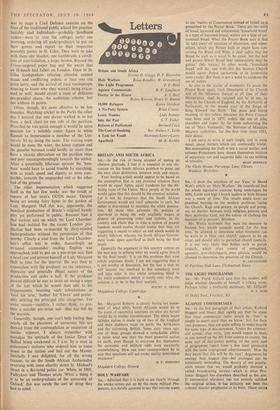Britain and South Africa Jeremy D. Griggs, D. F. Horrobin
Holy Warfare Brian Brindle), W. Greystrong
The Light Programme P. F. Reid Against Commercials R. F. Laughton
Doctor in the House , A. S. Bird, Robin Barrow, Henry G. Button 10,000 Refugees Karen Gershon A No-Party System Brian Crozier
Lewis Namier Lady Namier Into the Past S. T. Fisher
Reform of Parliament Bernard Crick The Cost of Smoking Rev. Hubert V. Little A Task for Youth Montagu Lowry-Corry Apartheid M. R. Kohler BRITAIN AND SOUTH AFRICA
SIR,—At the risk of being accused of stating an obvious platitude, I feel it is essential in any dis- cussion on the South African problem to point out the very clear distinction between ends and means.
Your leading article would appear to be based on the assumption that in any eventual solution there would be equal rights, equal freedoms for the dif- fering races of the Union. Most people of the world would agree that this should be the eventual solution. Let it not be forgotten that the South African Government would not itself subscribe to such, but rather is determined to maintain the white domina- tion. All those who advocate the policies of apartheid as being the only available means at present of preserving order and stability in the country and claim that in time a system of greater freedom would evolve should realise that they are suggesting a means to attain an end which would be wholly different, whereas the. South African Govern- ment looks upon apartheid as itself being the final result.
Generally the argument in this country centres on the best way to achieve what we would agree should be the final result; it is on this problem that your article expresses doubt. I am not suggesting that it is not worthy of discussion, but the fear is that we will become too involved in this subsidiary issue and take sides in this whilst remaining blind to the main contention which is surely over what the solution is to be in the final analysis.










































 Previous page
Previous page